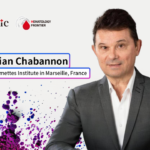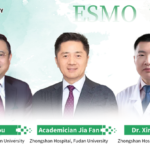
Editor’s Note: At the 2024 Chinese Anti-Cancer Association (CACA) Integration of Esophageal Cancer Academic Conference, Oncology Frontier invited Dr. Xiaobing Chen, Secondary Professor/Chief Physician at the Department of Internal Medicine at Henan Cancer Hospital and Chair of the CACA Esophageal Tumor Integrated Rehabilitation Committee, to provide an in-depth analysis of early signs of esophageal cancer, screening methods, and innovative strategies for clinical application of immune checkpoint inhibitors.Oncology Frontier: What early signs might indicate esophageal cancer, and what examinations should be performed at the hospital in case of suspected symptoms?
Dr. Xiaobing Chen: Esophageal cancer in its early stages can be hard to detect, but there are a few warning signs to be aware of. First, a sensation of a foreign body when swallowing, especially when eating rough food, should raise concern. Second, discomfort in the chest, such as dull pain, burning, or tightness, may indicate a problem. Lastly, experiencing a sensation of food getting stuck while swallowing should not be ignored. Although these symptoms are not specific to esophageal cancer, persistent occurrences should prompt vigilance.
For suspected cases of esophageal cancer, I recommend the following examinations at the hospital:
- Testing: Blood tests, including tumor markers, blood count, and stool occult blood tests. The gene methylation testing kit, developed by Academician Fan Daiming and Professor Nie Yongzhan, provides a new avenue for early diagnosis.
- Imaging: CT, MRI, and esophagography are useful for identifying abnormalities both inside and outside the esophagus.
- Endoscopy: Gastroscopy and esophagoscopy are critical in examining the esophagus directly.
- Biopsy: Biopsy of any esophageal lesions found remains the gold standard for diagnosing esophageal cancer.
Oncology Frontier: The CACA Esophageal Tumor Integrated Rehabilitation Professional Committee has published the “Expert Consensus on the Comprehensive Management of Clinical Applications of Immune Checkpoint Inhibitors in Esophageal Cancer.” What makes this guideline unique, and what role does it play in guiding the clinical application of immune checkpoint inhibitors?
Dr. Xiaobing Chen: In recent years, immunotherapy has made breakthrough progress in the treatment of esophageal cancer and other gastrointestinal tumors. However, the precise use of immune checkpoint inhibitors, management of potential side effects during treatment, and integration of immunotherapy with traditional rehabilitation strategies remain key challenges in clinical practice.
Therefore, the CACA Esophageal Tumor Integrated Rehabilitation Professional Committee organized a team of experts to carefully draft the “Expert Consensus on the Comprehensive Management of Clinical Applications of Immune Checkpoint Inhibitors in Esophageal Cancer.” This consensus has three significant features:
- Comprehensive Approach: The guideline covers principles of immune checkpoint inhibitor use and thoroughly discusses the full-process management of related adverse effects. It is highly practical and easily understood by community doctors.
- Integrated Thinking: Emphasis is placed on combining immunotherapy with multi-dimensional rehabilitation measures, including nutrition, exercise, and psychological support, highlighting the importance of multidisciplinary comprehensive treatment to achieve optimal therapeutic effects.
- Complete Content: The guideline is structured into six key sections and offers 21 recommendations, aiming to provide a standardized framework for esophageal cancer immunotherapy.
We understand that as new treatments and drugs continue to emerge, our consensus must be continually updated and refined to serve clinical practice better.
Oncology Frontier: Could you elaborate on how to ensure the safety and efficacy of immunotherapy for esophageal cancer patients to achieve the best balance of benefits and risks, thereby extending patient survival and enhancing quality of life?
Dr. Xiaobing Chen: The advent of immune checkpoint inhibitors marks a new era in cancer treatment. Initially, there was great enthusiasm in the medical community, with hopes that these drugs would offer hope to all patients. However, with time, we have entered a more cautious phase, recognizing that not all patients can benefit, and some may suffer severe side effects.
This shift has prompted clinicians to seek clearer guidelines, ushering in the era of precision medicine. We now emphasize precise testing and comprehensive assessment of patients to guide the rational application of immune checkpoint inhibitors.
First, we can predict which patients are likely to respond well to immunotherapy by assessing PD-L1 expression levels. Second, a thorough evaluation of patients’ overall health, including comorbidities and other related conditions, is essential. For example, special caution is required when treating patients with immune-related diseases such as systemic lupus erythematosus or nephrotic syndrome with immune checkpoint inhibitors.
The “Expert Consensus on the Comprehensive Management of Clinical Applications of Immune Checkpoint Inhibitors in Esophageal Cancer” provides detailed guidance, emphasizing the importance of personalized treatment. It advocates for precise biomarker testing and a comprehensive consideration of the patient’s overall condition to maximize therapeutic efficacy while minimizing risk.
Oncology Frontier: Multidisciplinary comprehensive diagnosis and treatment (MDT) models have proven to offer significant advantages in managing malignant tumors. How can we effectively integrate the expertise of different disciplines to optimize treatment strategies, thereby achieving both prolonged patient survival and improved quality of life?
Dr. Xiaobing Chen: MDT is not just a medical practice philosophy but a comprehensive treatment strategy that provides a full-scale diagnosis and treatment platform for patients. Academician Fan Daiming, President of the Chinese Anti-Cancer Association, advocates elevating the traditional MDT model to a patient-centered HIM model (Holistic Integrative Medicine). This shift emphasizes greater attention to the individualized needs and optimal benefits of patients, placing their well-being at the center.
In this approach, MDT serves as the specific implementation plan, while HIM represents a macro-strategy centered on the human being. Both work together, complementing each other, from philosophy to practice, to extend patient survival and enhance quality of life.
To transition from MDT to HIM, we must first establish a multidisciplinary team encompassing thoracic surgery, medical oncology, radiation oncology, pathology, radiology, nutrition, psychology, and psychiatry. Social workers and volunteers can also play a role, forming a comprehensive support system.
Additionally, team members must clearly define their roles and responsibilities. For example, surgeons focus on determining the timing and plan for surgery, medical oncologists develop drug treatment plans, while radiation oncologists design and implement radiation protocols. Other relevant disciplines, such as anesthesiology, pain management, and the ICU, provide surgical support to ensure safety and success.
Oncology Frontier: Early screening is crucial for reducing cancer incidence. What screening methods are currently adopted for esophageal cancer in China, and who are the primary screening targets?
Dr. Xiaobing Chen: Early prevention is the key to combating esophageal cancer. We now have a basic understanding of its causes, known as the “1+X” theory, proposed by Professor Dong Zigang, Vice President of Zhengzhou University. This theory suggests that hot and spicy foods are the primary pathogenic factor, while smoking, drinking, insufficient intake of fruits and vegetables, staying up late, stress, and low immunity are all contributing factors.
Although we have not fully uncovered all the causes of esophageal cancer, current findings underscore the importance of secondary prevention—early screening. Endoscopy remains the gold standard for early screening. However, due to the limited number of endoscopy doctors in China, it is unrealistic to implement nationwide endoscopic screening. Thus, the Chinese Anti-Cancer Association developed the “CACA Guidelines for the Diagnosis and Treatment of Esophageal Cancer Precancerous Lesions,” for which I served as deputy editor and participated in a national tour lecture series.
The guidelines specify the identification of high-risk groups, primarily individuals over the age of 45 with any of the following conditions: residence in an area with a high incidence of esophageal cancer, family history of esophageal cancer, history of esophageal diseases, long-term poor dietary habits, or a history of radiotherapy for head and neck tumors.
However, for those who should undergo endoscopy but haven’t due to various reasons, there is an urgent need for a non-invasive, convenient screening method. Gene methylation testing offers such a possibility, requiring only a 5 ml blood sample. A positive result would indicate the need for endoscopy, while a negative result allows for close observation and regular re-examination.
The gene methylation testing kit, developed by Academician Fan Daiming and Professor Nie Yongzhan’s team, has passed clinical validation and been approved for market. This achievement not only fills me with great excitement but also marks a major step forward in the early screening of esophageal cancer in China.
Summary
Dr. Xiaobing Chen elaborated on the early warning signals of esophageal cancer, effective screening methods, and innovative strategies for immune checkpoint inhibitors. He emphasized the importance of recognizing symptoms such as difficulty swallowing and chest pain and recommended multiple diagnostic approaches like blood tests, imaging assessments, and endoscopic examinations for accurate diagnosis. He also highlighted the significance of the “Expert Consensus on the Comprehensive Management of Clinical Applications of Immune Checkpoint Inhibitors in Esophageal Cancer,” providing clinical doctors with detailed guidance on individualized treatment plans and the necessity of multidisciplinary comprehensive treatment. Additionally, Professor Chen stressed the critical role of early screening in reducing esophageal cancer incidence, recommending active endoscopic screening for high-risk populations and pointing out the broad applicability of gene methylation testing in non-invasive screening, which will aid in early detection, diagnosis, and treatment.
Dr. Xiaobing Chen
- PhD in Oncology, Secondary Professor/Chief Physician, PhD Supervisor
- Deputy Director of Internal Medicine and Vice-Secretary of the Party Branch, Director of the Second Department of Gastroenterology, Henan Cancer Hospital
- National Health Science Communication Expert, Expert with State Council Special Allowance, Distinguished Expert in Henan Province
- Board Member of the Chinese Anti-Cancer Association (CACA), Executive Director of the Henan Pharmaceutical Association
- Chair of the CACA Esophageal Tumor Integrated Rehabilitation Professional Committee
- Vice Chair of CACA Media Communication Working Committee, Tumor Integrated Rehabilitation Working Committee
- Vice Chair of the CACA Infectious Tumors, Integrated Tumor Nephrology, and Tumor Exercise Rehabilitation Special Committees
- Standing Member and Deputy Secretary-General of the CSCO Patient Education Expert Committee
- Member and Popular Science Ambassador of the Esophageal Cancer Prevention and Control State Key Laboratory
- Director of the Henan Digestive Tract Tumor Precision Treatment Engineering Research Center


